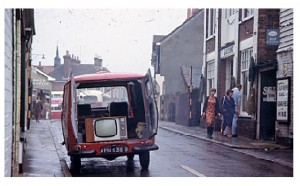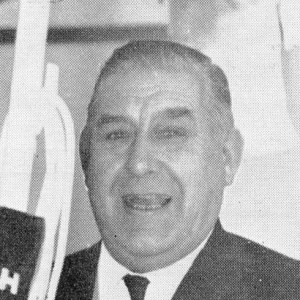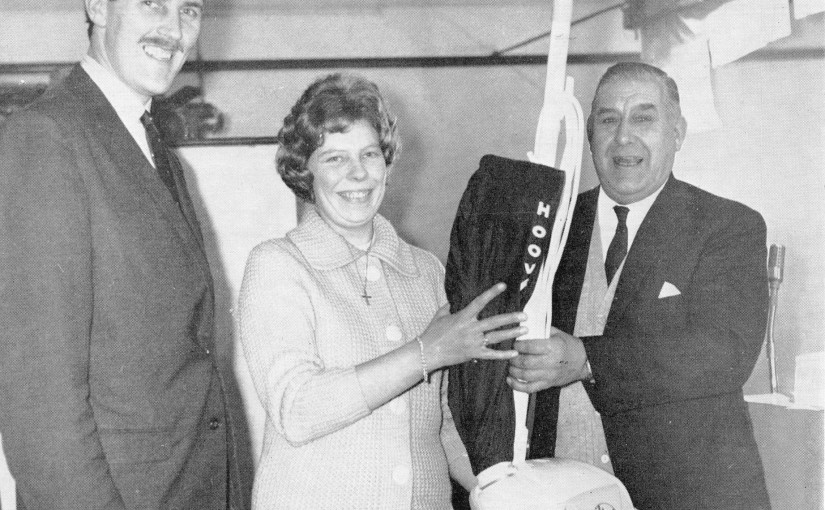Jim Snr. had always been fascinated with television. He saw the 1949 F.A. Cup Final, along with a crowd of about 20, including son, Jim Jnr., squeezed into a small room at Jack Ashenden’s house in Cyprus Place. Wolverhampton Wanderers beat Leicester City by three goals to one. He told Young Jim on the walk home that for the next year’s final they would have a television of their own.
And so it was. Money was saved and put aside and just before the 1950 Cup Final a 9″ Bush with bakelite cabinet was installed by Arthur Wilson who had a Radio & Television shop on Longley’s Corner.
Television was in its infancy, programmes were only screened for two hours a day, from 8pm – 10pm. and the first night-time outside broadcast, a speedway event from Harringay, was a failure. All that was seen was a blur of light!
Things soon improved and the whole family became television fans. Jim’s wife, Win, would put the set on first thing in the morning and do her housework to the recorded music that accompanied a test card for the use of television engineers.
1953 saw the Coronation televised. This was before the great television boom and there were very few sets operating in Rye. No less than forty neighbours and children were invited for this great event. Sandwiches and tea were on the go all day. These were the days of monarchy when almost everyone was a Royalist and no voice was ever raised against the Crown.
By 1958, when Hire Purchase was introduced, television came available to the majority. Jim Snr. recognised the possibilities and a family conference took place. Should they take an enormous risk and start a television business? They had very little cash, it had been a hand to mouth existence window cleaning, chimney sweeping and putting up the odd aerial for Arthur Wilson. They had £50, no shop and no knowledge of the inside of a television. They did have a van and ladders and expertise in erecting aerials and in Jim Snr., one of the best salesmen in Rye. Both Jims had had enough of cleaning windows and sweeping chimneys, it was time for a change, they decided to attempt the impossible, there was no going back.
They would overcome each problem as it came up. First was cash. To get one television plus an aerial and other vital accessories would require around £100. So Jim Snr. set off to borrow some cash. He tried the bank, no luck, so on the way back he called into Young’s the Butcher on Longley’s Corner for sausages, told Mr. Young of his plan and how the Bank would not come up with the money. The butcher fished £50 out of his wallet, wished Jim the very best in the venture and turned to his next customer. What a man, his fine gesture opened up new horizons for the family.
Next it was off to the wholesalers, Brown Brothers in Eastbourne. They could not supply without an address to send the goods to, so Jim Snr. took another risk. The shop at 55 Cinque Ports Street had been empty for years, it belonged to Mr. Christmas the local Bookmaker who ran his offices from behind the shop. In those days betting shops were not allowed by law, all bets had to be made over the phone. The shop was left empty because Mr. Christmas was waiting for betting shops to become legal, a possibility at any time.
55 Cinque Ports Street was given as the address of the new television business and Brown’s promised to deliver at 11am. the following morning.

At ten on that fateful day Jim Senior met with Mr. Christmas and asked if he could rent the shop. At first there was a point blank refusal but the persuading powers of the prospective TV dealer were stretched to their limit and by 10.50 agreement had been reached. Yes! He could have the shop at £5 per week with the very strict proviso that should new legislation come in allowing betting shops in the United Kingdom then one week’s notice would be given. No sooner than Mr. Christmas had given Jim the key and disappeared into the door that led down a side passage to his betting operation premises, a big van with Brown Brothers written on the side arrived with the ‘stock’ for the new shop.
One ‘Stella’ 17″ television, one H aerial, reel of co-ax aerial cable, box of black tape and one dozen aerial plugs. Within minutes a second-hand portable radio, record player and wind-up gramophone had been removed from the family house and placed in the shop window. With this small stock the great adventure began.
At this point any sales had to be for cash or cheque, no Hire Purchase for a new business until they became established. By 2pm. the first sale was made, it involved a part exchange so the new set was replaced in the shop by a second hand 12″ model. Another 17″ Stella was ordered immediately and arrived at eleven the following morning. The business was off the ground.
No sooner had the new set arrived than Jim Snr. had it sold. There were no more “Stella’s” at Eastbourne but they had a ‘Regentone’ 17″. That would do but it would have to be collected as there were no Saturday deliveries. Young Jim went with his friend Michael Mills in Michael’s car to get the new set and by the time they got back there was a message to deliver it to Rye Harbour where Jim Snr. was waiting to install it! And so it went on.
Win arrived home from a trip to the High Street to find her own television gone. She thought it had been stolen, but no, ‘H’, as she called him, had sold it. Supplies were not arriving fast enough!
This problem was relieved when Brown Brothers decided that enough business had been done to warrant giving the firm a monthly account. Within a month of the shop opening there were four new televisions on display for sale. The problem of a television at home still cropped up from time to time but Win would order a taxi at the end of the day and take a set home from the shop!
Then a new problem reared its head, breakdowns! The first two came on the same day, it was a crisis. Replacement sets were provided while the sets were repaired, but where would they be repaired? There was a fine television engineer in Northiam called Clive Peacock. An arrangement was made and sets were taken to his shop for repair. He delivered them back himself when they were done. Clive was able to help for several months, until the workload got too much but even when Clive Wall was recruited as a very young full time engineer, Clive from Northiam still helped out on problem jobs.
Clive Wall was a great character, he could turn his hand to anything mechanical or electrical. He had a dry wit and could recite any number of far fetched stories without a trace of expression on his face, the twinkle in his eye was the only thing that ever gave the game away.
It was when a chap from Mercantile Credit called and offered a hire purchase arrangement that the problem of supply reared its head again. Jim Snr. was of the opinion that everyone should have a television set. Up to now he could only serve customers who had cash but from the moment he got the hire purchase agreements in his hands almost everyone was able to afford one. Sales soared, even Young Jim, who spent his days looking after the shop (in conjunction with Win) and putting up aerials, started getting in on the act. Then came the introduction of three new channels BBC 2, ITV and Channel Four joined BBC 1. These programmes were transmitted on a different system 625 lines instead of 405. The quality of pictures were much superior and signals came from a transmitter at Dover not London.
Aerials had to be turned and new sets obtained or old sets converted. It was a very busy time for The Television Man, as Jim had been named.
Demand was outstripping supply and it was only a deal to take 72 sets in one go and pay for them over a four month period that offered a solution. The one delivery almost swamped the shop, there were sets piled on top of one another four deep. Selling such a number in four months was a tall order but with The Television Man on the warpath the task was completed with time to spare.
“Stop the van,” cried Jim Snr. “That house has no aerial”. He was off and knocking on the door. Within five minutes he was back to the van, “Get the ladder off son,” he told the eldest son “The gentleman wants a weeks free trial.” The aerial was up in twenty minutes and the set installed in thirty. A week later the ‘gentleman’ was waiting with pound notes. Once sampled, a television was never returned.
One of the best stories of The Television Man was told by Bobby Edwards. “He came in the room as the cowboy was drawing his pistol and before he fired the old set was swapped over, the form was signed and I was the proud owner of a new television!” he said.
One day ‘Young Jim’ had sold three televisions by five o” clock when his father arrived to see how things were going. He was very competitive and decided he must at least equal that total by closing time at six. The first two sales were to gentlemen he knew and called into the shop off the street with his famous, “Come and look at this,” cry. The final one was at ten to six. The lady, who lived at Cadborough Cliff told her husband later that she had only gone into the shop to pay 2d. she owed for a stamp! He had arrived home to find the new set installed and working!
It was boom time in Rye during the 1960’s, businesses thrived. It was a time for small shopkeepers and entrepreneurs. There was a weekly Cattle Market and the term ‘market town’ was correct. Folk came in from the villages and did their weekly shopping in the plentiful grocery, clothes and general stores to be found in the High Street, Cinque Ports Street and Landgate. Saturdays were bustling and busy and folk laden with parcels and bags could be seen walking home to Tilling Green or catching buses back to Peasmarsh, Beckley, Camber etc. It was a time when it was fun to be in business, government interference was a thing of the future. There was no one who enjoyed his job more than The Television Man.

